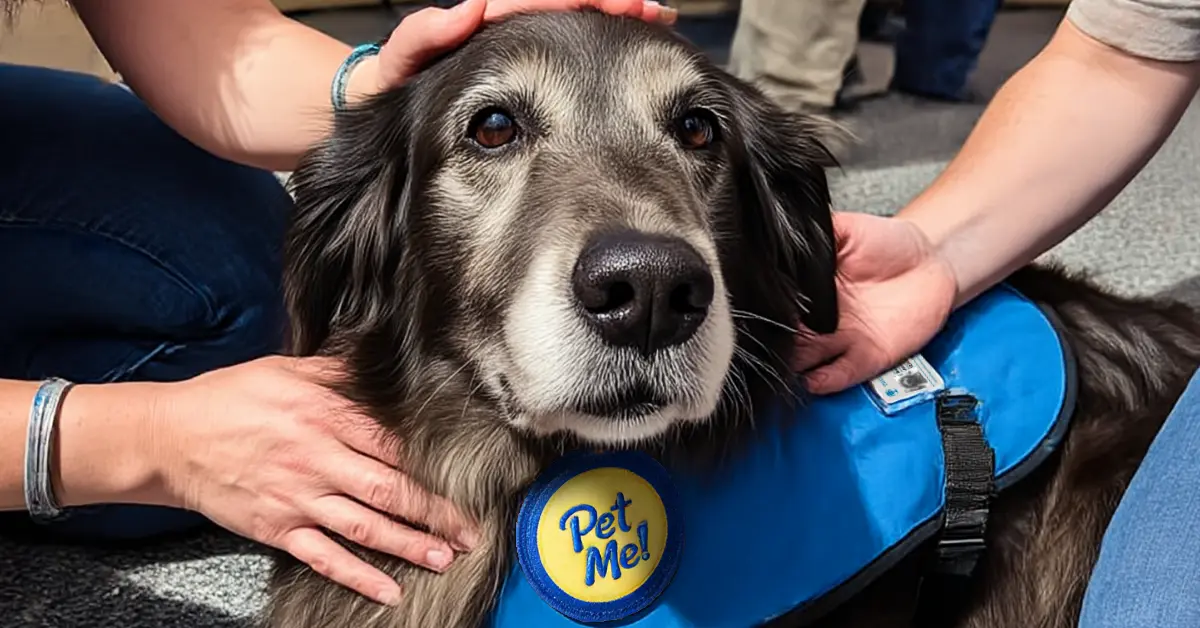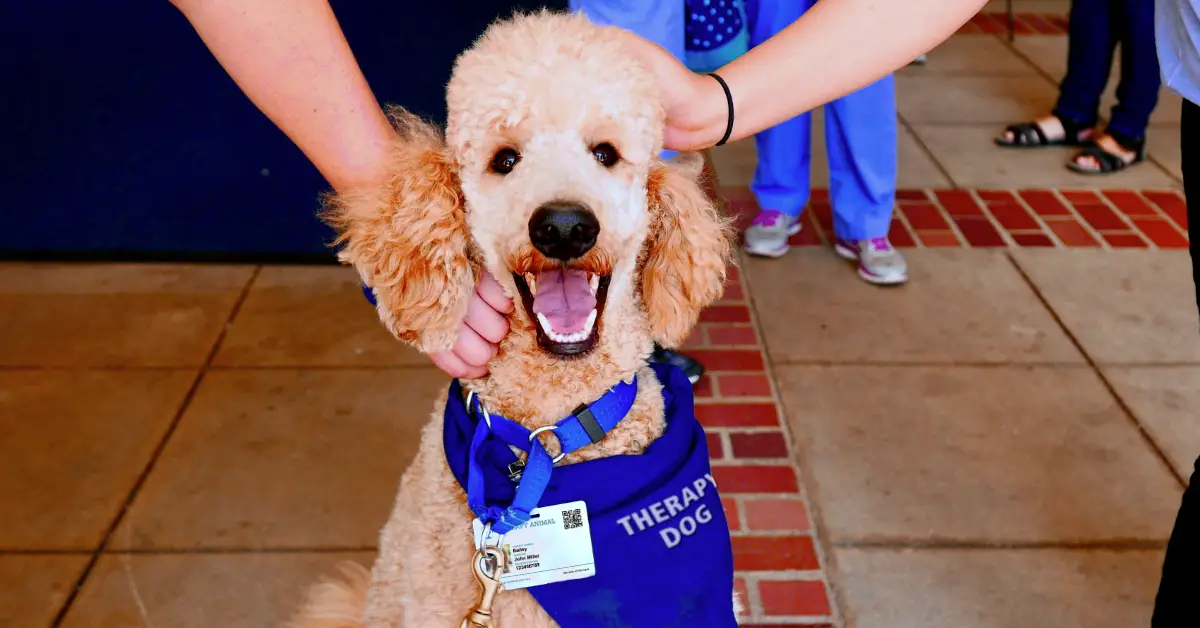Therapy Dog Certification Online

Here’s what to do if you want to certify your therapy dog online:
- Complete therapy dog handler training
- Make sure your dog can pass a therapy dog organization evaluation
- Register your therapy dog online with Service Dog Certifications to get an ID card and certification
The process to turn your dog into a therapy dog can’t be completely done online. You need to do real-world training and evaluation of your therapy dog. However, this doesn’t mean the internet is useless for preparing a therapy dog. Many organizations offer online components as part of their certification process, and you can also use online training resources. Additionally, we offer online registration and documentation for therapy dog teams.
In this article:
- Online therapy dog handler education courses
- Online therapy dog registration and documentation
- What to keep in mind about therapy dogs
Online Therapy Dog Handler Education Courses
Several major therapy dog organizations require or offer online education for handlers. Pet Partners requires all handlers to complete their online course before evaluation. The course costs $80 and covers fundamentals of animal-assisted interventions, understanding stress signals in animals, infection control and safety protocols, professional boundaries and ethics, and how to read your dog’s body language during visits.
The course takes approximately 8–10 hours to complete and includes interactive elements, videos, and a final exam. You must pass the course before scheduling your team evaluation. After completing the online course, you’ll still need to pass an in-person team evaluation.
The Alliance of Therapy Dogs, although not requiring a formal course, provides extensive online materials, including training videos that demonstrate proper techniques, preparation guides for their hands-on evaluation, and downloadable practice scenarios for home training.
Last but not least, Therapy Dogs International offers online access to handler handbooks and guidelines, training tips and best practices, as well as preparation materials for their temperament evaluation.
Beyond formal courses, the internet offers valuable preparation resources. Some professional dog trainers now offer virtual therapy dog preparation sessions via video calls. While they can’t replace hands-on training, these sessions can help with teaching proper handling techniques, explaining evaluation criteria, troubleshooting specific behavioral issues, and providing guidance on training progression.
YouTube and professional training platforms host thousands of videos covering basic obedience skills essential for therapy work, desensitization techniques for medical equipment, proper leash handling in crowded environments, and how to practice evaluation scenarios at home.
Online Therapy Dog Registration and Documentation
After you and your dog have successfully passed an evaluation with a recognized therapy dog organization or passed a self-evaluation, you can get registration and identification documentation. Many facilities prefer to see official ID cards and certificates that clearly identify your therapy dog team, which is where we can help.
We provide ID cards and certificates that document your therapy dog status, as well as an online registry where individuals can look up your dog.
What to Keep in Mind About Therapy Dogs
While there are national organizations that will certify your therapy dog, there is no universal legal standard for what constitutes a therapy dog. However, there are some basic requirements that your therapy dog should meet before it can be considered a therapy dog.
Your therapy dog should, of course, be well-behaved and follow all commands. Therapy dogs should also be calm and in your control at all times. This is especially important for therapy dogs as they work in settings such as hospitals and schools with lots of people, noise, and unexpected distractions. Therapy dog handlers should also have an understanding of how to deal with people who are experiencing distress.
It’s important to note that while therapy dog teams often have items such as certificates, identification cards, vests, and even trading cards, these items don’t confer any special rights. They also do not substitute for proper training of both the therapy dog and handler. A therapy dog handler is always directly responsible for any representations made about their therapy dog’s qualifications.
Therapy dog accessories are popular with handlers because they’re usually invited to public places, such as schools, libraries, and hospitals, where dogs are normally not allowed. Having these items is an easy way to communicate publicly that your dog is there to provide a service to others. Some staff members at venues that normally don’t allow animals may not be aware that a therapy dog is joining them, and a therapy dog ID can help avoid misunderstandings.
About the Author: The writing team at Service Dog Certifications is made up of folks who really know their stuff when it comes to disability laws and assistance animals. Many of our writers and editors have service dogs themselves and share insights from their own experiences. All of us have a passion for disability rights and animals.
Related Articles

How to Certify a Therapy Dog
Getting your dog certified as a therapy dog can give it more credibility and open doors to places that need them, like hospitals, schools, and nursing homes. The certification process can take 3–6 months and costs between $300 and $500, depending on the organization you choose. Getting your dog certified as a therapy dog takes […]

Read More

How to Register Your Dog as a Therapy Dog?
Humans are lucky to have dogs as our companions. Dogs used to help us watch livestock or help us hunt. Now, they are here to provide us with much-needed support. Unfortunately, people often get assistance animal regulations wrong. We are here to help clear things up. The first step is to understand the rules and regulations […]

Read More

Can a Pit Bull Be a Therapy Dog or Emotional Support Dog?
When we say “Pitbull,” it may unfairly conjure up images of a blood-thirsty beast out to destroy anything in its path. Nothing could be further from the truth. The Pitbull has gotten a bad reputation over the years due to cruel people using them for illegal dog fighting rings. These dogs are victims of animal […]

Read More

